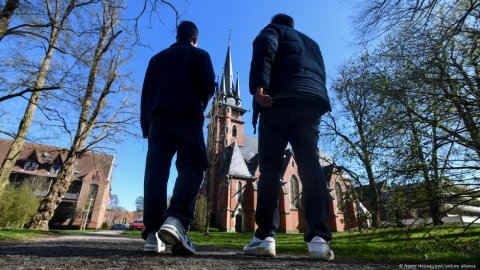Understanding the Surge in Church Asylum Requests in Germany
In recent times, Germany has witnessed a significant increase in church asylum requests, drawing attention to the broader implications of immigration policies and humanitarian protections. As the global landscape shifts, vulnerable individuals are seeking refuge in places they perceive to be safe and supportive. This trend raises critical questions about the effectiveness of existing asylum systems and the role of religious institutions in providing sanctuary.
The Context of Church Asylum
Church asylum, or “Kirchenasyl” in German, refers to the practice where religious institutions offer shelter and protection to individuals facing deportation. This tradition is rooted in humanitarian principles and has seen a resurgence as asylum protections become more precarious.
What is Driving the Increase?
Several factors contribute to the rise in church asylum requests in Germany:
- Decreased Legal Protections: Many asylum seekers are finding that their legal avenues for protection are dwindling. Stricter immigration laws and policies have made it challenging for individuals to gain asylum status.
- Heightened Fear of Deportation: With an increase in deportation activities, many individuals, particularly those from conflict zones, are turning to churches as a last resort for safety.
- Supportive Religious Communities: Churches often provide not only shelter but also emotional and social support, making them appealing safe havens for those in distress.
The Role of Churches in Providing Asylum
Religious institutions have historically played a pivotal role in offering refuge to those in need. In Germany, churches are stepping up to fill the gaps left by the state.
How Churches Support Asylum Seekers
Churches provide various forms of assistance to asylum seekers, including:
- Emergency Shelter: Many churches offer immediate housing options for individuals facing homelessness or imminent deportation.
- Legal Support: Some churches have teams of volunteers who help asylum seekers navigate the complex legal landscape, providing guidance and resources.
- Community Integration: Religious communities often play a vital role in helping asylum seekers integrate into society through language classes, job training, and social events.
Challenges Faced by Churches in Providing Asylum
While churches have been pivotal in supporting asylum seekers, they face numerous challenges:
- Legal Risks: Offering asylum can put churches at odds with the law, as they may face legal repercussions for sheltering individuals without the proper documentation.
- Resource Limitations: Many churches operate on limited budgets and may struggle to provide adequate support without outside assistance.
- Community Resistance: Some local communities may oppose church asylum efforts, leading to tensions and challenges in providing necessary support.
The Broader Implications for Immigration Policy
The increase in church asylum requests has sparked a national conversation about immigration policies in Germany. Many advocates argue that the system needs significant reform to adequately protect vulnerable populations.
Calls for Reform
As the number of church asylum cases grows, several key points have emerged in discussions about potential reforms:
- Enhancing Legal Protections: Advocates are urging lawmakers to create more robust legal frameworks that protect the rights and safety of asylum seekers.
- Streamlining Asylum Processes: The need for a more efficient and humane asylum process is becoming increasingly critical as delays can have dire consequences for applicants.
- Strengthening Community Support: There is a growing recognition of the need to foster partnerships between government bodies and religious organizations to enhance support systems.
The Future of Church Asylum in Germany
As Germany grapples with the complexities of immigration and asylum, the role of churches will likely continue to evolve. The rising number of church asylum requests reflects not only the challenges faced by asylum seekers but also the resilience and commitment of religious communities to provide care and assistance.
Conclusion
The surge in church asylum requests in Germany highlights a critical intersection of faith, social justice, and immigration policy. As protections for asylum seekers decrease, churches have stepped in to offer refuge and support, demonstrating the power of community and compassion. Moving forward, it is essential for policymakers to engage with these issues thoughtfully, ensuring that vulnerable individuals receive the protection and support they desperately need.
In a world increasingly defined by migration, the question remains: how can societies balance security with compassion? The answer may lie in the lessons we learn from the actions of those who choose to open their doors and hearts to those in need.










